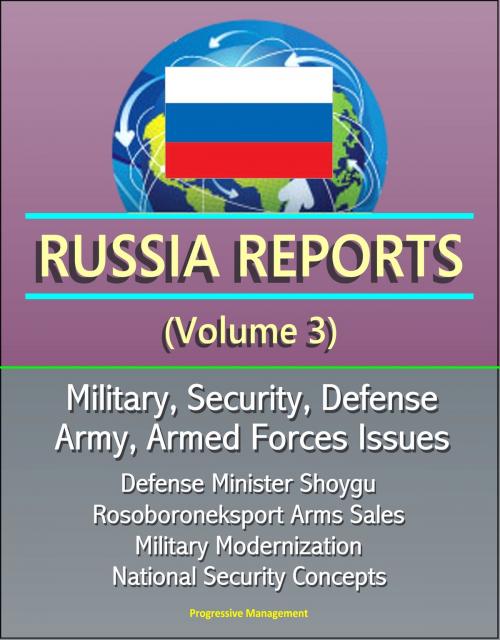Russia Reports (Volume 3) - Military, Security, Defense, Army, Armed Forces Issues - Defense Minister Shoygu, Rosoboroneksport Arms Sales, Military Modernization, National Security Concepts
Nonfiction, History, Asian, Russia| Author: | Progressive Management | ISBN: | 9781311610010 |
| Publisher: | Progressive Management | Publication: | March 25, 2014 |
| Imprint: | Smashwords Edition | Language: | English |
| Author: | Progressive Management |
| ISBN: | 9781311610010 |
| Publisher: | Progressive Management |
| Publication: | March 25, 2014 |
| Imprint: | Smashwords Edition |
| Language: | English |
Twelve reports, studies, and documents provide special insight into the Russian military, with detailed discussions of vital topics which are of particular interest during the ongoing crisis involving Russian aggression against Crimea and the Ukraine. Reports in this compendium: Russian Political, Economic, and Security Issues and U.S. Interests * Russia's Emergency Defense Minister Sergey Shoygu - A Bio-Sketch * The Brain of the Russian Army: Futuristic Visions Tethered by the Past * Rosoboroneksport: Arms Sales and the Structure of Russian Defense Industry * Russia's Demographic Crisis and the Military: Strategic Impact and Security Implications in the 21st Century * Russian Defense Reform: Current Trends * Russian-American Security Cooperation after St. Petersburg: Challenges and Opportunities * Understanding Security Cooperation: A Comparison of the US and Russian Systems of Security Cooperation * The Bear Facts: Russians Appraise the Stryker Brigade Concept * Threats to Russian Security: The View from Moscow * Russia's Armed Forces on the Brink of Reform * The United States and Russia into the 21st Century.
Russia's armed forces now number less than 1 million, down from 4.3 million Soviet troops in 1986. In the 1990s and much of the 2000s, troop readiness, training, morale, and discipline suffered, and most arms industries became antiquated. Russia's economic growth in recent years has supported greatly increased defense spending to restructure the armed forces and improve their quality. Mismanagement, changes in plans, corruption, manning issues, and economic constraints have complicated this restructuring.
If the 'state is the soul writ large,' then Sergey Shoygu serves as an apt metaphor for Russia today. Shoygu was trained as an engineer in the Soviet system and arrived in Moscow just as the USSR began to fall apart. For more than 20 years, as the Minister of Emergency Services, he served as Russia's 'first responder.' In this capacity, Shoygu helped to deal with natural and man-made disasters, gaining an intimate knowledge of the country's domestic challenges and the reputation of a pragmatic and effective leader. As a resourceful minister and politician, he also profited from his proximity to the Kremlin elite, strengthening regional and national ties and developing sharp survival skills to ensure his official longevity.
Clearly, the rebuilding of Russian military strength is a high priority of President Vladimir Putin, and one to which he and his subordinates have devoted considerable time and resources. Therefore, inattention to Russian defense policy is unwise and even dangerous because it causes us to overlook potentially major changes not only in Russian policy, but in international affairs more generally. Dr. Irina Isakova's monograph represents an effort to overcome our neglect and provide readers a comprehensive account of the defense reform, or what Moscow calls optimization. It encompasses virtually all aspects of the reform of the forces, their organizational structure, the financing of the military, reform of the defense industrial sector, etc. This topic is both timely and particularly relevant and provides a significant addition to the series.
The demographic crisis in Russia limits the policy options available to its political and military leaders and creates havoc for the international community as to how it could and should deal with Russia as a major power on the world stage. The post-September 11th environment requires greater cooperation and alliances among nations to combat a growing number of trans-national and asymmetrical threats such as terrorism, insurgencies, nuclear proliferation, and the trafficking of drugs and people. A strong and stable Russia is a critical component in the on-going efforts of the free world to re-shape the global security landscape to meet the new and emerging threats of the 21St century.
Twelve reports, studies, and documents provide special insight into the Russian military, with detailed discussions of vital topics which are of particular interest during the ongoing crisis involving Russian aggression against Crimea and the Ukraine. Reports in this compendium: Russian Political, Economic, and Security Issues and U.S. Interests * Russia's Emergency Defense Minister Sergey Shoygu - A Bio-Sketch * The Brain of the Russian Army: Futuristic Visions Tethered by the Past * Rosoboroneksport: Arms Sales and the Structure of Russian Defense Industry * Russia's Demographic Crisis and the Military: Strategic Impact and Security Implications in the 21st Century * Russian Defense Reform: Current Trends * Russian-American Security Cooperation after St. Petersburg: Challenges and Opportunities * Understanding Security Cooperation: A Comparison of the US and Russian Systems of Security Cooperation * The Bear Facts: Russians Appraise the Stryker Brigade Concept * Threats to Russian Security: The View from Moscow * Russia's Armed Forces on the Brink of Reform * The United States and Russia into the 21st Century.
Russia's armed forces now number less than 1 million, down from 4.3 million Soviet troops in 1986. In the 1990s and much of the 2000s, troop readiness, training, morale, and discipline suffered, and most arms industries became antiquated. Russia's economic growth in recent years has supported greatly increased defense spending to restructure the armed forces and improve their quality. Mismanagement, changes in plans, corruption, manning issues, and economic constraints have complicated this restructuring.
If the 'state is the soul writ large,' then Sergey Shoygu serves as an apt metaphor for Russia today. Shoygu was trained as an engineer in the Soviet system and arrived in Moscow just as the USSR began to fall apart. For more than 20 years, as the Minister of Emergency Services, he served as Russia's 'first responder.' In this capacity, Shoygu helped to deal with natural and man-made disasters, gaining an intimate knowledge of the country's domestic challenges and the reputation of a pragmatic and effective leader. As a resourceful minister and politician, he also profited from his proximity to the Kremlin elite, strengthening regional and national ties and developing sharp survival skills to ensure his official longevity.
Clearly, the rebuilding of Russian military strength is a high priority of President Vladimir Putin, and one to which he and his subordinates have devoted considerable time and resources. Therefore, inattention to Russian defense policy is unwise and even dangerous because it causes us to overlook potentially major changes not only in Russian policy, but in international affairs more generally. Dr. Irina Isakova's monograph represents an effort to overcome our neglect and provide readers a comprehensive account of the defense reform, or what Moscow calls optimization. It encompasses virtually all aspects of the reform of the forces, their organizational structure, the financing of the military, reform of the defense industrial sector, etc. This topic is both timely and particularly relevant and provides a significant addition to the series.
The demographic crisis in Russia limits the policy options available to its political and military leaders and creates havoc for the international community as to how it could and should deal with Russia as a major power on the world stage. The post-September 11th environment requires greater cooperation and alliances among nations to combat a growing number of trans-national and asymmetrical threats such as terrorism, insurgencies, nuclear proliferation, and the trafficking of drugs and people. A strong and stable Russia is a critical component in the on-going efforts of the free world to re-shape the global security landscape to meet the new and emerging threats of the 21St century.















